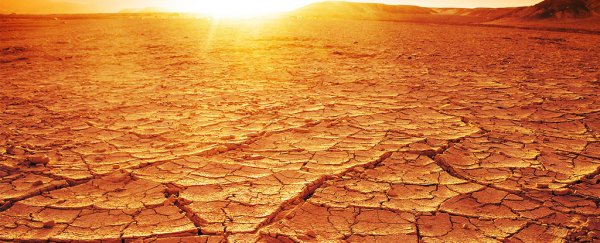Humanity is on a crash course with the natural world, and for decades, climate scientists have been throwing up stop sign after stop sign.
But no matter how many warnings we receive - and let's be honest, at this point we have had far too many - no one is willing to put their foot down and pump the brakes.
Well, it's time to buckle up folks because unless we take drastic action, and soon, catastrophe may be inevitable.
A new report from the UN Intergovernmental Panel on Climate Change (IPCC) suggests we are on our last lap, and the homestretch is even shorter than we thought.
The report, which encompasses more than 6,000 scientific references, has found that some of the most severe climate change scenarios could be felt at an even lower temperatures of global warming, occurring decades earlier than expected.
"The next few years are probably the most important in our history," said Debra Roberts, an IPCC co-chair.
The 2015 Paris Accord (which no major industrialised country is currently on track to meet) set out to prevent more than 2 degrees Celsius warming from preindustrial times.
This target was long considered the threshold for the most dangerous effects of climate change, including the mass destruction of coral reefs, widespread food shortages, destructive wildfires and coastal flooding.
But those past predictions appear to have been far too conservative (a common critique of IPCC reports in general). The new report has examined what will happen if the world warms by just 1.5 degrees, and it doesn't look good.
"1.5 degrees is the new 2 degrees," Jennifer Morgan, executive director of Greenpeace International, told The Washington Post after attending the finalisation of the IPCC report in Incheon, the Republic of Korea.
If global emissions continue at the current rate, the 91 authors of the report predict the world will reach 1.5 degrees by as early as 2040.
This means we have roughly 10 to 14 years to avoid a scenario we thought we had decades to prevent.
As the goal posts have moved, so too has our definition of 'severe'.
At 1.5 degrees, the report finds that 70 to 90 percent of tropical coral reefs will vanish. But at 2 degrees, that number jumps to more than 99 percent.
At 1.5 degrees, the authors predict the Arctic Ocean will be free of sea ice once per century. At 2 degrees, that will be more like once per decade.
And if we hold warming to 1.5 degrees instead of 2 degrees, the report suggests global sea level rise will be a whole 10 centimetres lower - potentially stopping what the report describes as a "disproportionately rapid evacuation" of people from the tropics.
It seems that what was once our worst case scenario may now be one of our best. Even still, it will be extremely difficult to achieve and will require drastic and immediate action on an international scale.
"Limiting warming to 1.5 degrees Celsius is possible within the laws of chemistry and physics but doing so would require unprecedented changes," said Jim Skea, another co-chair at the IPCC and an expert in sustainable energy at the Imperial College of London.
Overall, the authors say that current greenhouse gas emissions must be reduced by 45 percent from 2010 levels by 2030. By 2050, emissions will need to be reduced by 100 percent.
At the same time, the world must all but completely phase out coal, while boosting renewable energy by nearly 50 percent.
Today, we are not on track to meet any of these goals. In fact, the IPCC report says that we are ultimately heading towards 3 degrees Celsius.
"It's telling us we need to reverse emissions trends and turn the world economy on a dime," Myles Allen, an Oxford University climate scientist and an author of the report, told The New York Times.
Given humanity's track record, this dramatic and unprecedented action seems unlikely.
While more than 180 countries have accepted the report's summary, the US (which is the second biggest emitter in the world) said that their acceptance of the report does not "imply endorsement" of the findings.
"We reiterate that the United States intends to withdraw from the Paris agreement at the earliest opportunity absent the identification of terms that are better for the American people," a statement from the US State Department reads.
In reality, it seems far more likely that the world will 'overshoot' the 1.5 degree mark, causing irreversible harm. At that point, the authors warn that our only chance will be some sort of carbon removal technology, which has not been proven to work on the necessary scale and will not be able to save ecosystems already lost.
"Frankly, we've delivered a message to the governments," Skea said at a press event, according to The Washington Post.
"It's now their responsibility … to decide whether they can act on it."
The report has been published by the IPCC.
